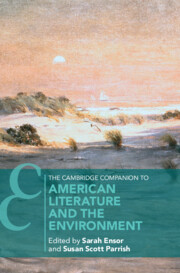Book contents
- The Cambridge Companion to American Literature and the Environment
- The Cambridge Companion to American Literature and the Environment
- Copyright page
- Dedication
- Contents
- Figures
- Contributors
- Acknowledgments
- A Note on the Cover Image
- Introduction
- Part I Environmental Histories
- Part II Environmental Genres and Media
- Chapter 6 The Heat of Modernity: The Great Gatsby as Petrofiction
- Chapter 7 Children in Transit / Children in Peril: The Contemporary US Novel in a Time of Climate Crisis
- Chapter 8 Meta-Critical Climate Change Fiction: Claire Vaye Watkins’s Gold Fame Citrus
- Chapter 9 Junk Food for Thought: Decolonizing Diets in Tommy Pico’s Poetry
- Chapter 10 Tender Woods: Looking for the Black Outdoors with Dawoud Bey
- Part III Environmental Spaces, Environmental Methods
- Notes
- Index
- Cambridge Companions to …
Chapter 6 - The Heat of Modernity: The Great Gatsby as Petrofiction
from Part II - Environmental Genres and Media
Published online by Cambridge University Press: 10 March 2022
- The Cambridge Companion to American Literature and the Environment
- The Cambridge Companion to American Literature and the Environment
- Copyright page
- Dedication
- Contents
- Figures
- Contributors
- Acknowledgments
- A Note on the Cover Image
- Introduction
- Part I Environmental Histories
- Part II Environmental Genres and Media
- Chapter 6 The Heat of Modernity: The Great Gatsby as Petrofiction
- Chapter 7 Children in Transit / Children in Peril: The Contemporary US Novel in a Time of Climate Crisis
- Chapter 8 Meta-Critical Climate Change Fiction: Claire Vaye Watkins’s Gold Fame Citrus
- Chapter 9 Junk Food for Thought: Decolonizing Diets in Tommy Pico’s Poetry
- Chapter 10 Tender Woods: Looking for the Black Outdoors with Dawoud Bey
- Part III Environmental Spaces, Environmental Methods
- Notes
- Index
- Cambridge Companions to …
Summary
This chapter rereads The Great Gatsby as a novel deeply concerned with the temptations and dangers of fossil fuel culture. After providing an overview of the contemporaneous Teapot Dome Scandal, Stecopoulos examines Fitzgerald’s subtle linkage of the novel’s more precarious characters with petro-modernity. By analyzing figural accounts of Gatsby as oil detector, Myrtle Wilson as gusher, and George Wilson as depleted energy field, the chapter offers an ecologically oriented account of a classic American novel.
- Type
- Chapter
- Information
- Publisher: Cambridge University PressPrint publication year: 2022
- 1
- Cited by

